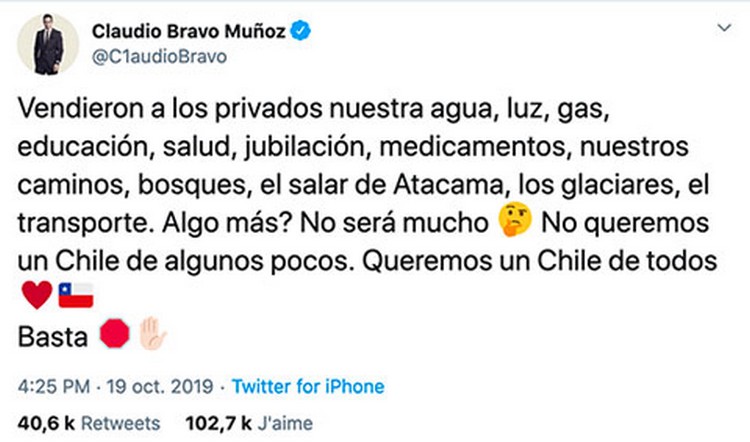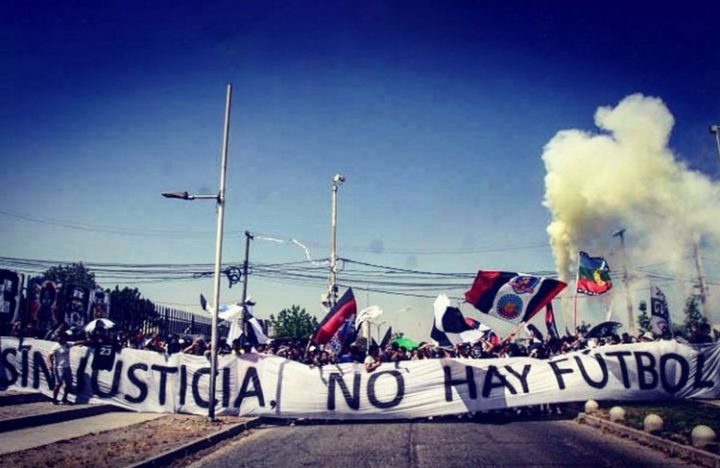Again, the history of football is closely linked to Chilean politics. Let’s go back in time. A few days after the September 11, 1973 coup d’etat against Salvador Allende, the Soviet Union refused to play against Chile in the Estadio nacional de Santiago, transformed into a detention center where prisoners were tortured and summarily executed.
On November 21, 1973, the approval of FIFA having been issued after a visit to the stadium, quickly cleaned up for the occasion, the most unusual and sad match in football history sees the Chilean team play… alone, without opponent, and score a goal after a few minutes.
FIFA validates the sore of 1-0 and Chile qualifies for the 1974 World Cup in Germany. Carlos Caszely, the star striker of the Chilean team, retains a bitter taste and, when the Chilean selection is received by General Pinochet in person before his flight to Europe, he refuses to shake hands with the dictator.
In retaliation, the junta sequestrated and tortured his mother, which Carlos Caszely denounced in 1988, in a campaign clip for the people to vote “no” to the plebiscite which was to decide to keep Pinochet in power. On October 6, the verdict of the polls falls: a majority of votes (56%) decides to end seventeen years of a bloody dictatorship [1].
“We don’t play with the working class. We woke up and we won’t stop”
Thirty-one years later, the Chilean people are protesting against neoliberalism carved in constitutional stone since the dictatorship. While the uprising was harshly suppressed by the soldiers who had left the barracks, awakening the worst trauma of the juntas time, the football world expressed its solidarity.
Already, on October 19, 2019, the Chilean goalkeeper Claudio Bravo Munoz spreads this message on the networks: “They sold our water, our electricity, our gas, our education, our forests, the Atacama Saltworks, our glaciers, our transportations to the private sector. Even more? It will not be much? We do not want a Chile of a few people, we want a Chile for all. Enough. “

After about twenty days of mobilization, various supporters’ clubs have spoken out against calls to play the matches as if the country had returned to “normalcy”. Supporters of the Santiago Wanderers de Valparaiso say: “As an ultra club, Los Panzers will not allow any player to step on the pitch (…) it must be made clear that we are not playing with the working class. We woke up and we won’t stop. “
Those of Colo Colo, Garra Blanca, denounce: “They intend to use the clubs as a political tool to promote their interests. They want to tire us out, annoy us, alienate us and make us forget the fight (…) They don’t fool us. To paraphrase our great captain [Claudio Bravo], in the current context of the country, football has come to the background because we are fighting for more important things. “
This impressive insurgency on the streets of Chile led to the displacement, on November 23, of the Copa Libertadores final in Lima, Peru, instead of the Chilean capital as initially planned.
“Pinera, son of a b…, assassin like Pinochet”
In solidarity with the mobilization, while the Chilean selection was to face Peru in Lima on November 19, player Gary Medel explains: “As a team, we have decided not to play the friendly match agreed with Peru, given the social climate in our country”.
Medel continues, on behalf of his peers: “We are football players, but above all we are people and citizens. We know that we represent a whole country and today Chile has other priorities than next Tuesday’s game. There is a more important issue which is that of equality, to change many things so that all Chileans live in a more just country“.
On November 22, 2019, on the initiative of the main first division football clubs (de Colo Colo, Universidad de Chile, Universidad Catolica, Cobreloa, Union Espanola y Santiago Wanderers) a banner is placed on the facade of the Telefonica Tower, no far from the Place de la Dignite: “We have wasted a lot of time fighting each other” (“Perdimos mucho tiempo peleando entre nosotros”).
On the same day, a group of supporters interrupted the match between Union La Calera and Deportes Iquique, resulting in the sixth suspension of the championship. The National Professional Football Association (ANFP) will eventually cancel the 2019 championship after having suspended it several times.
On Sunday January 16, from the stands of the German Becker stadium, located in the Municipality of Temuco, where the semi-final of the Chile Cup was played between Colo Colo and the Universidad Catolica, a subversive song resounded that set the tone for the exasperation at the government’s repression: “Pinera, son of a b…, assassin like Pinochet”.
“This is just the beginning”
While two football supporters have died recently – Jorge Mora, nicknamed “el Neco”, carried away by a riot truck, and Ariel Moreno Molina, twenty-four years old, shot in the head – the supporters threaten new actions. “With the assassination of Neco, and even more so with that of Ariel, the social movement ignited”, comments Rosario Galaz, an activist from Barrancas, the Neco district.
A huge banner “Los pacos los mataron” (The cops killed them) is displayed in the stands of the Monumental de Santiago stadium during the match between Universidad Catolica and Colo Colo on February 16. A match disrupted by a multitude of firecrackers, until one of them injured the player Nicolas Blandi and interrupted, probably very late, the game.
Colo Colo supporters’ press release explains: “The Chilean riflemen murdered two of our brothers (…). Few players expressed their support or reacted to these facts and there was no minute of silence on the part of the club or the SA Company. The judgment of el Neco was a joke, they decided to do playing matches without opposing supporters, increased ticket prices. “
And to announce: “We apologize to Nicolas Blandi, our intention has never been to attack any player. (…) without justice, there is no normalcy, if their idea is to continue the repression against ours and our club of supporters, we will continue to be active and to fight. This is just the beginning.”
In Chile, which is coming out of a summer vacation, everything suggests a reactivation of the social rebellion, which has never really stopped since its outbreak in October. It has already continued with the mobilization of this March 2, “el super lunes”, and will continue during the great feminist march of March 8 and the general strike the following day.
Footnotes
[1] Antoine Dumini, Francois Ruffin, « Quand des stars du foot risquaient leur carrière, voire leur vie, pour la démocratie et la justice », Bastamag, June 10, 2014. See also the video “Rebeldes del Futbol Carlos Caszely”.
Source : http://www.cadtm.org/Chilean-football-between-repression-and-rebellion










